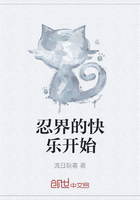"Yes, sir, thirty years ago I laid me down there, and was happy. For it was out in the country then—out in the breezy, flowery, grand old woods, and the lazy winds gossiped with the leaves, and the squirrels capered over us and around us, and the creeping things visited us, and the birds filled the tranquil solitude with music. Ah, it was worth ten years of a man' s life to be dead then! Everything was pleasant. I was in a good neighborhood, for all the dead people that lived near me belonged to the best families in the city. Our posterity appeared to think the world of us. They kept our graves in the very best condition; the fences were always in faultless repair, head-boards were kept painted or whitewashed, and were replaced with new ones as soon as they began to look rusty or decayed; monuments were kept upright, railings intact and bright, the rose-bushes and shrubbery trimmed, trained, and free from blemish, the walks clean and smooth and graveled. But that day is gone by. Our descendants have forgotten us. My grandson lives in a stately house built with money made by these old hands of mine, and I sleep in a neglected grave with invading vermin that gnaw my shroud to build them nests withal! I and friends that lie with me founded and secured the prosperity of this fine city, and the stately bantling of our loves leaves us to rot in a dilapidated cemetery which neighbors curse and strangers scoff at. See the difference between the old time and this—for instance: Our graves are all caved in now; our head-boards have rotted away and tumbled down; our railings reel this way and that, with one foot in the air, after a fashion of unseemly levity; our monuments lean wearily, and our gravestones bow their heads discouraged; there be no adornments any more—no roses, nor shrubs, nor graveled walks, nor anything that is a comfort to the eye; and even the paintless old board fence that did make a show of holding us sacred from companionship with beasts and the defilement of heedless feet, has tottered till it overhangs the street, and only advertises the presence of our dismal resting-place and invites yet more derision to it. And now we cannot hide our poverty and tatters in the friendly woods, for the city has stretched its withering arms abroad and taken us in, and all that remains of the cheer of our old home is the cluster of lugubrious forest trees that stand, bored and weary of a city life, with their feet in our coffins, looking into the hazy distance and wishing they were there. I tell you it is disgraceful!
"You begin to comprehend—you begin to see how it is. While our descendants are living sumptuously on our money, right around us in the city, we have to fight hard to keep skull and bones together. Bless you, there isn' t a grave in our cemetery that doesn' t leak not one. Every time it rains in the night we have to climb out and roost in the trees and sometimes we are wakened suddenly by the chilly water trickling down the back of our necks. Then I tell you there is a general heaving up of old graves and kicking over of old monuments, and scampering of old skeletons for the trees! Bless me, if you had gone along there some such nights after twelve you might have seen as many as fifteen of us roosting on one limb, with our joints rattling drearily and the wind wheezing through our ribs! Many a time we have perched there for three or four dreary hours, and then come down, stiff and chilled through and drowsy, and borrowed each other' s skulls to bail out our graves with—if you will glance up in my mouth now as I tilt my head back, you can see that my head-piece is half full of old dry sediment how top-heavy and stupid it makes me sometimes! Yes, sir, many a time if you had happened to come along just before the dawn you' d have caught us bailing out the graves and hanging our shrouds on the fence to dry. Why, I had an elegant shroud stolen from there one morning—think a party by the name of Smith took it, that resides in a plebeian graveyard over yonder—I think so because the first time I ever saw him he hadn' t anything on but a check shirt, and the last time I saw him, which was at a social gathering in the new cemetery, he was the best-dressed corpse in the company—and it is a significant fact that he left when he saw me; and presently an old woman from here missed her coffin—she generally took it with her when she went anywhere, because she was liable to take cold and bring on the spasmodic rheumatism that originally killed her if she exposed herself to the night air much. She was named Hotchkiss—Anna Matilda Hotchkiss—you might know her? She has two upper front teeth, is tall, but a good deal inclined to stoop, one rib on the left side gone, has one shred of rusty hair hanging from the left side of her head, and one little tuft just above and a little forward of her right ear, has her underjaw wired on one side where it had worked loose, small bone of left forearm gone—lost in a fight has a kind of swagger in her gait and a ' gallus' way of going with: her arms akimbo and her nostrils in the air has been pretty free and easy, and is all damaged and battered up till she looks like a queensware crate in ruins—maybe you have met her?"
"God forbid!" I involuntarily ejaculated, for somehow I was not looking for that form of question, and it caught me a little off my guard. But I hastened to make amends for my rudeness, and say, "I simply meant I had not had the honor—for I would not deliberately speak discourteously of a friend of yours. You were saying that you were robbed—and it was a shame, too—but it appears by what is left of the shroud you have on that it was a costly one in its day. How did..."














